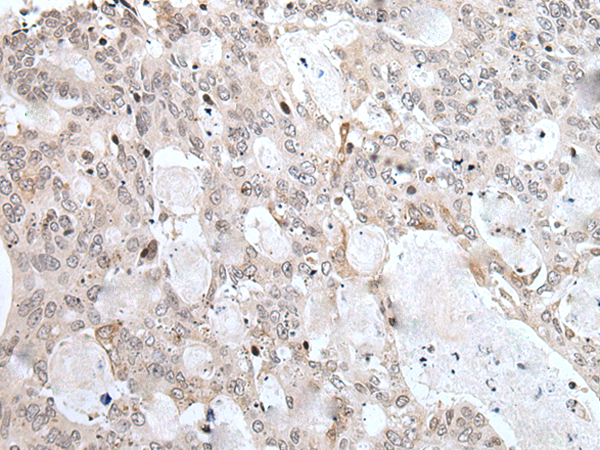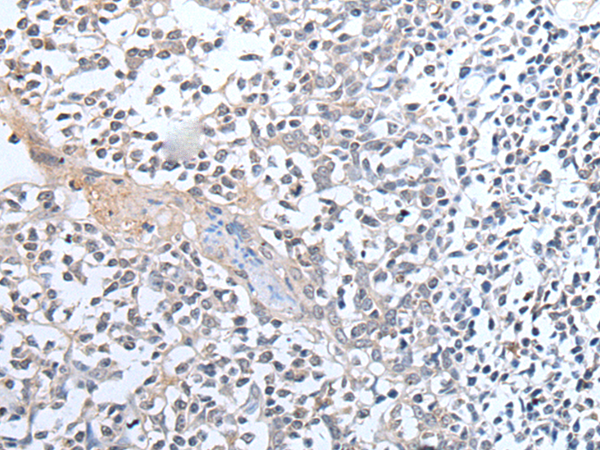

| WB | 咨询技术 | Human,Mouse,Rat |
| IF | 咨询技术 | Human,Mouse,Rat |
| IHC | 1/25-1/100 | Human,Mouse,Rat |
| ICC | 技术咨询 | Human,Mouse,Rat |
| FCM | 咨询技术 | Human,Mouse,Rat |
| Elisa | 1/2000-1/5000 | Human,Mouse,Rat |
| Aliases | OX; PPOX; NRCLP1 |
| Host/Isotype | Rabbit IgG |
| Antibody Type | Primary antibody |
| Storage | Store at 4°C short term. Aliquot and store at -20°C long term. Avoid freeze/thaw cycles. |
| Species Reactivity | Human, Mouse, Rat |
| Immunogen | Synthetic peptide of human HCRT |
| Formulation | Purified antibody in PBS with 0.05% sodium azide and 50% glycerol. |
+ +
以下是3篇关于HCRT(hypocretin/orexin)抗体的代表性文献,涵盖其在疾病检测和神经研究中的应用:
---
1. **文献名称**:*Autoantibodies against hypocretin receptor 2 are rare in narcolepsy*
**作者**:Bergman P. et al.
**摘要**:研究通过检测发作性睡病患者血清中是否存在针对HCRT受体2(HCRTR2)的自身抗体,发现仅有极少数患者呈阳性,提示HCRTR2自身抗体并非发作性睡病的主要致病因素。
---
2. **文献名称**:*Hypocretin (orexin) biology and the pathophysiology of narcolepsy with cataplexy*
**作者**:Mignot E.
**摘要**:综述总结了HCRT神经元在睡眠-觉醒调节中的作用,指出多数发作性睡病患者脑脊液中HCRT-1水平显著降低,但未发现直接针对HCRT的自身抗体证据,推测可能与T细胞介导的神经元损伤有关。
---
3. **文献名称**:*Detection of hypocretin-1 in human plasma: development of an enzyme-linked immunosorbent assay using high-affinity monoclonal antibodies*
**作者**:Arihara Z. et al.
**摘要**:研究开发了一种基于单克隆抗体的高灵敏度ELISA方法,用于检测人血浆中的HCRT-1.验证了其在低浓度下的稳定性和特异性,为临床监测HCRT水平提供了新工具。
---
**备注**:目前关于HCRT抗体的直接研究较少,多数聚焦于HCRT神经元的缺失机制(如自身免疫攻击)或检测技术开发,而非针对HCRT本身的抗体病理作用。如需更具体文献,建议结合研究目的补充关键词(如“自身免疫”或“检测方法”)。
Hypocretin (HCRT), also known as orexin, is a neuropeptide produced in the hypothalamus, primarily involved in regulating wakefulness, appetite, and energy homeostasis. HCRT antibodies are tools developed to detect and study these peptides or their receptors (OX1R and OX2R) in research and clinical settings. The discovery of HCRT deficiency in narcolepsy type 1 (NT1) catalyzed interest in these antibodies, as most NT1 patients exhibit low cerebrospinal fluid HCRT-1 levels and autoimmune-mediated loss of HCRT-producing neurons.
HCRT antibodies are widely used in immunohistochemistry, Western blotting, and ELISA to map HCRT neuronal pathways, assess protein expression in disease models, or diagnose NT1. Autoantibodies targeting HCRT neurons have been hypothesized in NT1 pathogenesis, though direct evidence remains limited. Recent studies also explore HCRT's role in neurodegenerative diseases, addiction, and metabolic disorders, expanding the utility of these antibodies.
Commercially available HCRT antibodies vary in specificity, targeting distinct epitopes of HCRT-1. HCRT-2. or receptors. Validation remains critical due to cross-reactivity risks. Ongoing research aims to refine antibody accuracy and develop therapeutic antibodies for HCRT-related disorders, underscoring their importance in neuroscience and translational medicine.
×